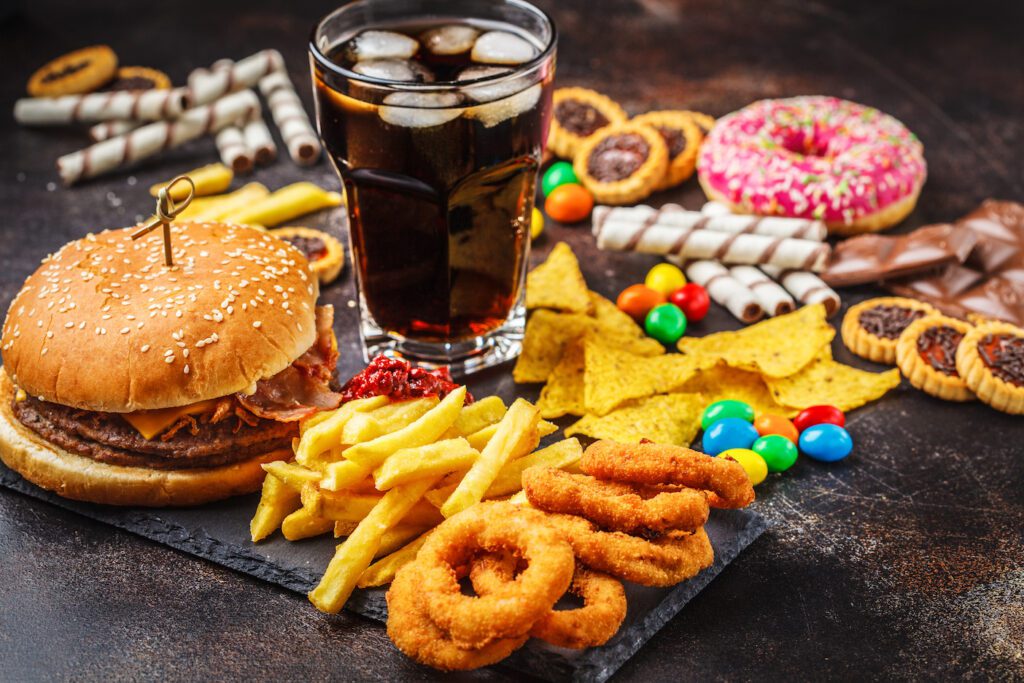
The Junk Food Cycle
The Abundance of Food
Over the past 2 decades the nature of food has changed. The consumption of fresh, wholefoods has declined, whilst highly processed foods have become a ubiquitous presence in our lives. ‘Junk food’ (clue in the name!) is convenient and cheap. The food industry spend large sums creating the perfect mouth feel, so they become tantalisingly tasty. In this blog, we explore the junk food cycle and the urgent need for reform.

The Impact on Health
What seems like a harmless indulgence is fuelling a vicious cycle that poses a significant threat to our health and well-being. In the 1950’s, a minority of people in the UK were considered overweight or obese. In modern day Britain, there is a minority of individuals who are considered the ‘ideal’ weight. Ultra-processed food has played a large part in this seismic shift. Stripped of fibre and water, these foods fail to trigger the body’s ‘I’m full’ signals. Hence the ease with which we overeat when these form part of the diet.
The Junk Food Cycle
Did you know that the average adult in the UK eats 5 times more crisps now than in 1972? On average, we are consuming 55% of our diets in the form of ultra-processed foods. Less than 35% of our food budget is being spent on fresh, whole produce to prepare at home. The annual market for confectionary in the UK is almost double that of fresh vegetables and fruit! An extraordinary set of statistics which should be sending shock waves through the population and across the halls of Westminster. This trend significantly increases the risk of developing chronic diseases such as heart disease, type 2 diabetes, and certain types of cancer. We are getting sicker by the mouthful and the NHS is at breaking point.
The annual market for confectionary in the UK is almost double that of fresh vegetables and fruit!
The consumption of junk food sets off a dangerous cycle that perpetuates poor dietary choices and negatively impacts our overall health. It plays havoc with our blood sugar levels, which yoyo at alarming rates. It is often devoid of essential nutrients. This lack of nourishment fuels cravings and hunger, as our bodies continue to seek the nutrients they need. As a result, individuals trapped in this cycle find themselves caught in a constant loop of unhealthy eating habits, leading to weight gain, chronic inflammation, and a compromised immune system.

Breaking Free from the Junk Food Cycle
Addressing the junk food cycle requires a multifaceted approach that involves individuals, families, communities, and policymakers. Education and awareness play a crucial role in empowering individuals to make healthier choices. By understanding the detrimental effects of junk food and the benefits of a balanced diet, individuals can take control of their health and break free from the junk food cycle.
Families and communities need support in creating an environment that promotes healthy eating habits. Schools need nutrition education programmes, communities need local farmers’ markets and community gardens. Collaboration between the public and private sectors is essential to create policies that regulate food marketing, improve food labelling, and promote the production and consumption of nutritious foods.
It is time to be BOLD!
The Urgent Need for Reform
So, what is required here? It is my opinion that we need significant state intervention. Taxes, laws, education, community cooking lessons, early intervention in the diets of our children. There is no alternative route. It is the only way that we’ll see meaningful change. Successive governments have kicked this junk food can down the road, fearing food industry and voter backlash. The most recent time this happened was with the release of the National Food Strategy, lead by Henry Dimbleby. This comprehensive document provides a clear route out of the current mess that we are in. Released with much fanfare, the government adoption has been a soggy firework. Cries of nanny-statism were followed by inaction. The fact that the UK government has once again shelved the ban on BOGOFs on junk food shows a total lack of commitment to change.
The Need for Action is Now
It is time to be BOLD. We need action and we need it now. We don’t know what the future holds and we don’t know what strategies will work for the best, so we need to try everything whilst we learn. So we take a scatter gun approach – reviewing, then expanding and contracting initiatives as we go.

Healthcare professionals, including nutritional therapists, should be actively involved in promoting reform. They can play a crucial role in raising awareness about the consequences of the junk food cycle and the urgent need for reform. They can provide evidence-based guidance to individuals seeking to improve their diets. By working collaboratively with other healthcare providers, policymakers, and community organizations, nutritional therapists can advocate for systemic changes and help shape a healthier food landscape.
I am committed to advocating for change and supporting individuals in their journey towards better nutrition and well-being. Together, we can break free from the grip of the junk food cycle and create a society that prioritises and nurtures our health. If you would like to find out more about my services, you can read more here. If you would like to book a free call to chat out your situation, you can do so here. For health steps you can take today, read here and here.
